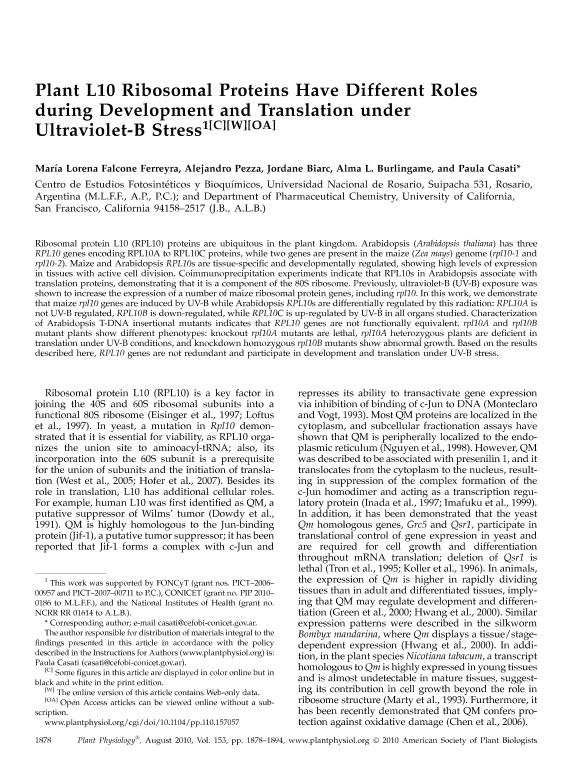Mostrar el registro sencillo del ítem
dc.contributor.author
Falcone Ferreyra, María Lorena

dc.contributor.author
Pezza, Alejandro

dc.contributor.author
Biarc, Jordane
dc.contributor.author
Burlingame, Alma L.
dc.contributor.author
Casati, Paula

dc.date.available
2017-04-19T15:30:47Z
dc.date.issued
2010
dc.identifier.citation
Falcone Ferreyra, María Lorena; Pezza, Alejandro; Biarc, Jordane; Burlingame, Alma L.; Casati, Paula; Plant L10 Ribosomal proteins have different roles during development and translation under ultraviolet-B stress; American Society Of Plant Biologist; Plant Physiology; 153; 4; 2010; 1878-1894
dc.identifier.issn
1532-2548
dc.identifier.uri
http://hdl.handle.net/11336/15444
dc.description.abstract
Ribosomal protein L10 (RPL10) proteins are ubiquitous in the plant kingdom. Arabidopsis (Arabidopsis thaliana) has three RPL10 genes encoding RPL10A to RPL10C proteins, while two genes are present in the maize (Zea mays) genome (rpl10-1 and rpl10-2). Maize and Arabidopsis RPL10s are tissue-specific and developmentally regulated, showing high levels of expression in tissues with active cell division. Coimmunoprecipitation experiments indicate that RPL10s in Arabidopsis associate with translation proteins, demonstrating that it is a component of the 80S ribosome. Previously, ultraviolet-B (UV-B) exposure was shown to increase the expression of a number of maize ribosomal protein genes, including rpl10. In this work, we demonstrate that maize rpl10 genes are induced by UV-B while Arabidopsis RPL10s are differentially regulated by this radiation: RPL10A is not UV-B regulated, RPL10B is down-regulated, while RPL10C is up-regulated by UV-B in all organs studied. Characterization of Arabidopsis T-DNA insertional mutants indicates that RPL10 genes are not functionally equivalent. rpl10A and rpl10B mutant plants show different phenotypes: knockout rpl10A mutants are lethal, rpl10A heterozygous plants are deficient in translation under UV-B conditions, and knockdown homozygous rpl10B mutants show abnormal growth. Based on the results described here, RPL10 genes are not redundant and participate in development and translation under UV-B stress.
dc.format
application/pdf
dc.language.iso
eng
dc.publisher
American Society Of Plant Biologist

dc.rights
info:eu-repo/semantics/openAccess
dc.rights.uri
https://creativecommons.org/licenses/by-nc-sa/2.5/ar/
dc.subject
Uv-B
dc.subject
Ribosomal Proteins
dc.subject
Arabidopsis Thaliana
dc.subject
Translation
dc.subject.classification
Bioquímica y Biología Molecular

dc.subject.classification
Ciencias Biológicas

dc.subject.classification
CIENCIAS NATURALES Y EXACTAS

dc.title
Plant L10 Ribosomal proteins have different roles during development and translation under ultraviolet-B stress
dc.type
info:eu-repo/semantics/article
dc.type
info:ar-repo/semantics/artículo
dc.type
info:eu-repo/semantics/publishedVersion
dc.date.updated
2017-04-18T14:03:31Z
dc.journal.volume
153
dc.journal.number
4
dc.journal.pagination
1878-1894
dc.journal.pais
Estados Unidos

dc.journal.ciudad
Rockville
dc.description.fil
Fil: Falcone Ferreyra, María Lorena. Consejo Nacional de Investigaciones Científicas y Técnicas. Centro Científico Tecnológico Rosario. Centro de Estudios Fotosintéticos y Bioquímicos (i); Argentina. Universidad Nacional de Rosario; Argentina
dc.description.fil
Fil: Pezza, Alejandro. Consejo Nacional de Investigaciones Científicas y Técnicas. Centro Científico Tecnológico Rosario. Centro de Estudios Fotosintéticos y Bioquímicos (i); Argentina. Universidad Nacional de Rosario; Argentina
dc.description.fil
Fil: Biarc, Jordane. University of California; Estados Unidos
dc.description.fil
Fil: Burlingame, Alma L.. University of California; Estados Unidos
dc.description.fil
Fil: Casati, Paula. Consejo Nacional de Investigaciones Científicas y Técnicas. Centro Científico Tecnológico Rosario. Centro de Estudios Fotosintéticos y Bioquímicos (i); Argentina. Universidad Nacional de Rosario; Argentina
dc.journal.title
Plant Physiology

dc.relation.alternativeid
info:eu-repo/semantics/altIdentifier/doi/http://dx.doi.org/10.1104/pp.110.157057
dc.relation.alternativeid
info:eu-repo/semantics/altIdentifier/url/http://www.plantphysiol.org/content/153/4/1878
dc.relation.alternativeid
info:eu-repo/semantics/altIdentifier/url/https://www.ncbi.nlm.nih.gov/pmc/articles/PMC2923885/
Archivos asociados
